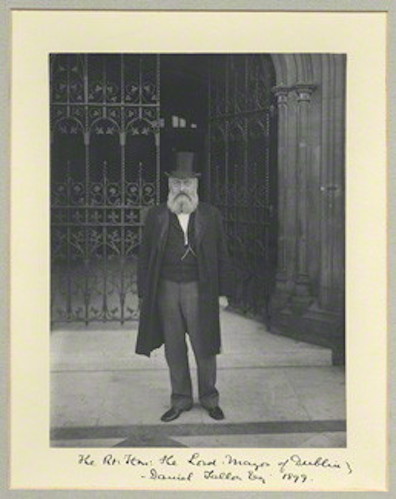"Dan Tallon," first mentioned in Calypso, was a
prominent Dublin wine merchant. He was also the city's Lord Mayor in the late
1890s. In Ithaca Bloom thinks back to the time when
Tallon was first elected to that office.
In
Calypso Bloom
thinks of poor country people from County Leitrim working as
servers in pubs, and "
Then, lo and behold, they blossom out
as Adam Findlaters or Dan Tallons." Tallon did come to
Dublin from County Wicklow, but there is no evidence that his
was a rags-to-riches story. Born in Rathdrum in 1838, he was
operating a Dublin tailoring business by the early 1860s. A
successful grocer and purveyor of wines and spirits when first
elected to the
Dublin
Corporation in 1890, he became High Sheriff of Dublin in
1895 and was elected Lord Mayor in 1897, 1898, and 1899. His
three consecutive terms were the longest stretch served by any
Lord Mayor since the reorganization of the Corporation in the
middle of the 19th century.
It is natural that Bloom thinks of Tallon in connection with the
promotion of alcoholic consumption. In the
Dictionary of
Irish Biography, Patrick Maume observes that "For a
quarter of a century he was either vice-chairman or chairman of
the Licensed Grocers’ and Vintners’ Protection Association; he
played a leading role in spreading the organisation throughout
Ireland, and was described by one member as its ‘right arm’.
Temperance advocates, including Irish Irelanders, saw Tallon as
embodying the power of the drink lobby; after he boasted that as
spokesman for the drink trade he had only to ‘push the button’
and the Irish Party leadership would respond, D. P. Moran mocked
him as ‘Keeper of the Magic Button’."
Tallon accomplished much else. He advanced the Parnellite
cause after Parnell's downfall, raised funds in the United
States for the Parnell statue that now stands at the top of
O'Connell Street, met with President McKinley at the White
House, lectured widely in Britain, spoke to the mayors of
English cities about grave conditions in the west of Ireland,
agitated for the reduction of British taxes in Ireland, gave
freely to charitable causes, and managed several philanthropic
enterprises. He turned down opportunities to serve as an M.P.
in Westminster, choosing to work through the Dublin
Corporation instead. Although a nationalist, he was scorned by
Arthur Griffith and other
militant ("advanced") nationalists for his cautious policies
of incremental improvement.
